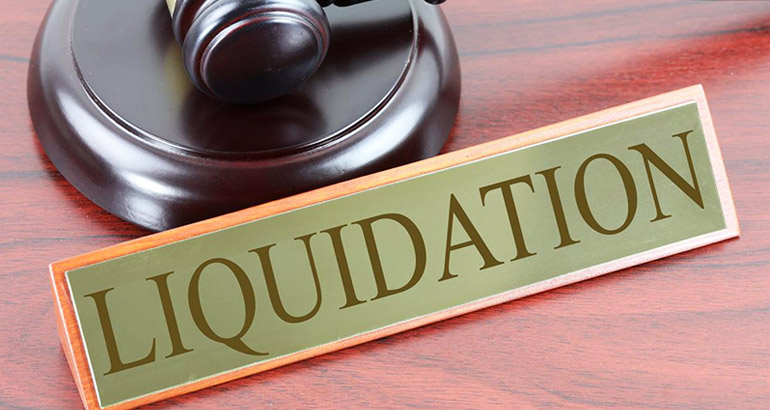Company Liquidation for Dummies
Company Liquidation for Dummies
Blog Article
An Unbiased View of Company Liquidation
Table of ContentsThe Company Liquidation IdeasThe Only Guide for Company LiquidationFascination About Company LiquidationHow Company Liquidation can Save You Time, Stress, and Money.All About Company Liquidation
A liquidator is specifically appointed to supervise the winding up of a company's affairs in order for it to be shut down usually when the company is going bankrupt. The liquidator is an objective 3rd party that manages the sale of firm assets in order to repay any superior debts.Their role consists of, yet is not restricted to: Objective Overseer: A liquidator is charged with working as an unbiased third celebration to look after the entire company liquidation procedure. Produce Statement of Matters: Liquidators have to develop a thorough statement of affairs record. This paper is distributed to financial institutions, detailing the present monetary status of the organization at the time of its liquidation.
After the liquidation of a business, its presence is removed from Firms Home and it discontinues to be a lawful entity. If supervisors navigated the process uncreative, there would certainly be no penalties or personal responsibility for firm financial debts expected. Now, with a tidy slate, directors can explore brand-new business chances, though specialist consultation is advisable.
All About Company Liquidation
If more than 90% of all business shareholders agree, liquidation can take place on short notice within seven days, the minimum statutory notification for creditors. Generally, the larger the liquidation and the more possessions and funding the service has, the longer the procedure will certainly take. 'Do I have to pay to liquidate my business?', the response will depend upon whether or not your company has any type of assets remaining when liquidating.

We recognize that no 2 companies are the same, which is why we will certainly take the time to learn more about your organization so we can suggest the very best strategy for you. We only work in your ideal interests, so you can be totally certain in the solution we give.
The Definitive Guide for Company Liquidation
In the UK, there is an established process to folding or reorganizing a limited firm, whether it is solvent or insolvent. This process is referred to as liquidation and can only be handled by a certified insolvency expert (IP) according to the Bankruptcy Act 1986. There are four major kinds of company liquidation procedure: Lenders' Voluntary Liquidation (CVL); Mandatory liquidation; Management; and Members' Voluntary Liquidation (MVL).

In these situations, it is very important that the business discontinues trading; if the company remains to trade, the supervisors can be held directly accountable and it anonymous can lead to the bankruptcy specialist reporting wrongful trading, known as misfeasance, which may bring about click resources lawful action. The supervisors designate a bankruptcy professional and as soon as this has actually been agreed and verified, there is a conference with the shareholders.
Of course, if there are no investors, this action of the procedure is not required (Company Liquidation). The IP takes control of the company and starts the business liquidation procedure. The directors are no more associated with what happens, consisting of the sale of the business's properties. However, if the supervisors desire any one of the possessions, they can inform the IP.
Our Company Liquidation Ideas
The main difference is that the business's financial institutions put on the court for an ending up order which compels the insolvent company right into a liquidation process. Most of the times, lenders take this activity as a last option since they have not gotten repayment with other forms of negotiation. The court designates an insolvency professional, additionally referred to as an official receiver, to conduct the required firm liquidation procedure.
This type of business liquidation is not voluntary and directors' conduct is reported to the UK's Assistant of State once the liquidation process has actually been completed. For that reason, look at these guys any kind of director that falls short to coordinate with the IP or has been associated with supervisor misconduct, or a fraudulent act, might lead to severe repercussions (Company Liquidation).
It is made use of as a way to shield the company from any kind of legal activity by its creditors. The supervisors of the business agree to make regular repayments to settle their financial obligations over a duration of time.
The Basic Principles Of Company Liquidation
This supplies the business with time to establish a plan going forward to save the business and prevent liquidation. Nevertheless, at this moment, directors hand control of the business over to the designated manager. If a business is solvent but the directors and shareholders want to close business, a Members Voluntary Liquidation is the right option.
The company liquidation process is taken care of by a liquidator selected by the directors and shareholders of the firm and they need to sign a statement that there are no creditors staying. The liquidation procedure for an MVL is comparable to that of a CVL because properties are know however the proceeds are dispersed to the supervisors and the investors of the firm after the liquidator's costs have been paid.
Report this page